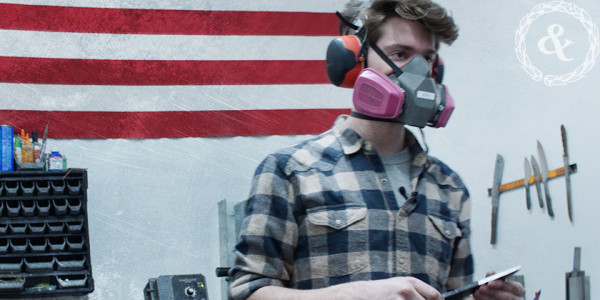

Joel R. Chapman traded-in the security of a steady paycheck, health insurance, meals and military housing he had as a Marine Corporal for art school in New York City. It wasn’t easy. He struggled to make friends and develop his creative side but he eventually found his community and launched a second career as a successful blacksmith forging heirloom knives in Brooklyn, NY.
We caught up with the owner of Chapman Knives about how he turned his weekend hobby into a small business. Here’s how he did it:

Joel standing in his studio located in Bushwick BrooklynHector Rene
HR: After serving in Iraq you used your Post 9/11 G.I. Bill to go to art school in NYC, what was that like?
JRC: The mental shift from the leaving the Marine Corps to attend art school is insane. It’s a completely different set of values. The Marine Corps gives you a task and you’re trained to execute that task, yet art school is a place where students are encouraged and graded on their ability to think independently so it was like learning a new language. I had to learn how to take critique instead of take orders. To go from a hyper-masculine mindset to an arguably feminine mindset, I think, is not a mental gymnastic many young Marines are inclined to be very good at.

Joel inspecting a blade.Hector Rene
HR: How do you apply the skills you learned in art school to make handcrafted knives?
JRC: Through art school, I learned how to socialize outside of uniform. This has helped me move forward within my own creative process, and that translates for me into what I’m doing now. Making knives by hand is an art, with histories dating back centuries. It’s something that for me, I hate halfway through forging but I have the discipline from the military to finish what I started and the creative and discerning eye from art school to understand what I don’t like about an unfinished project.
Hector Rene

HR: What makes a good knife?
JRC: The details you don’t see, craftsmanship and quality. It’s what a blacksmith does with the metal, it’s the heat treating process, the way the knife is sharpened, the metal in the blade and the quality in the materials used. Knives are not shovels. They’re not pry bars. They’re not screwdrivers. Even within knives, they can be very specific. They’re honed for a specific process. You would never bring a chef’s knife to the woods. You would never bring a Ka-bar to the kitchen. You have to be intentional in your choice of function before you can choose material or process.
Hector Rene

HR: What advice do you have for veterans who are transitioning into civilian life?
JRC: Getting out was hard, because I lacked purpose. I lacked a community, I had all the people that I knew and loved were thousands of miles away from me, and that was really hard, so I floundered, so it’s important to get out there, try new things, meet new people. Personally, I took up Knifemaking, Alpine Climbing, and Photography. It’s been a way for me to meet new people and make new friends.
Hector Rene

HR: Final thoughts?
I make these knives for the members of my tribe, for my friends and for people like me.
Chapman Knives is a veteran owned and operated knife company that uses American materials to create heirloom blades that are hand-crafted to last generations.
